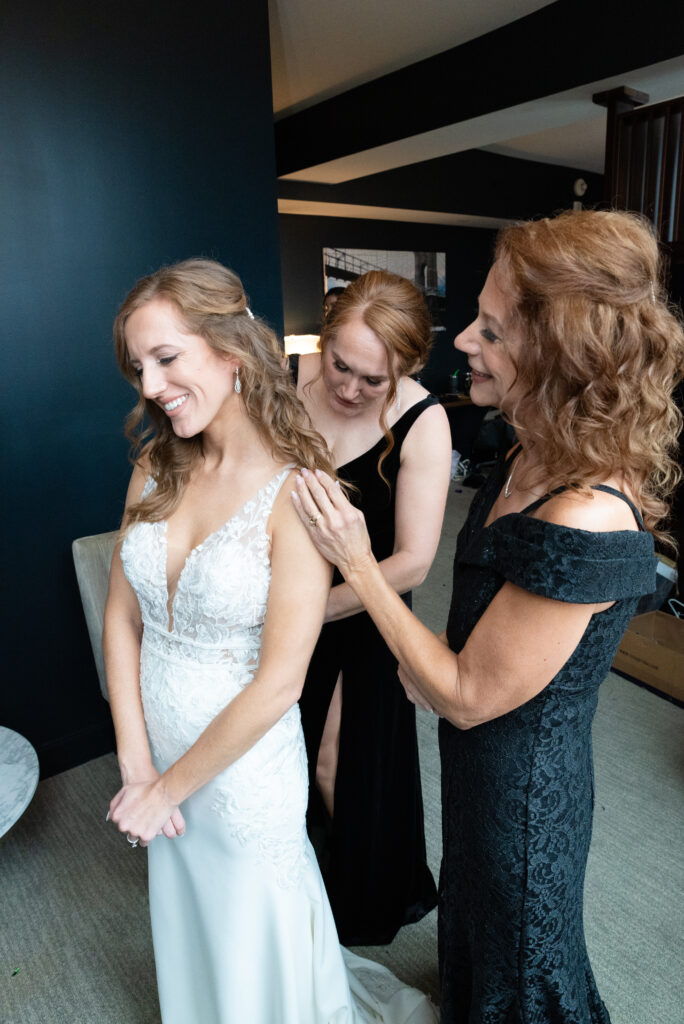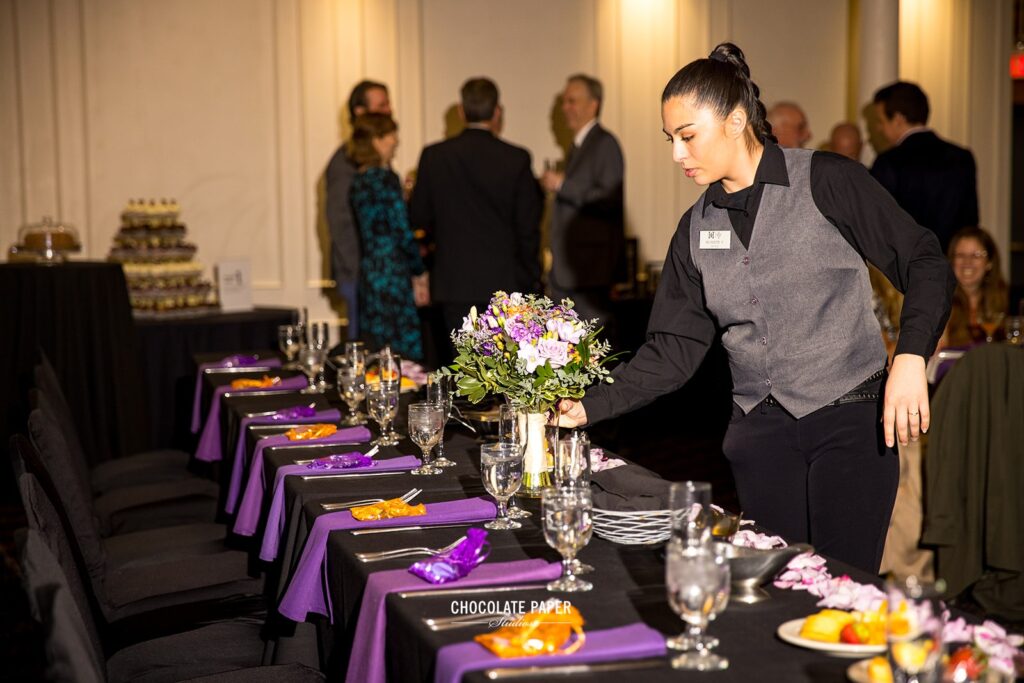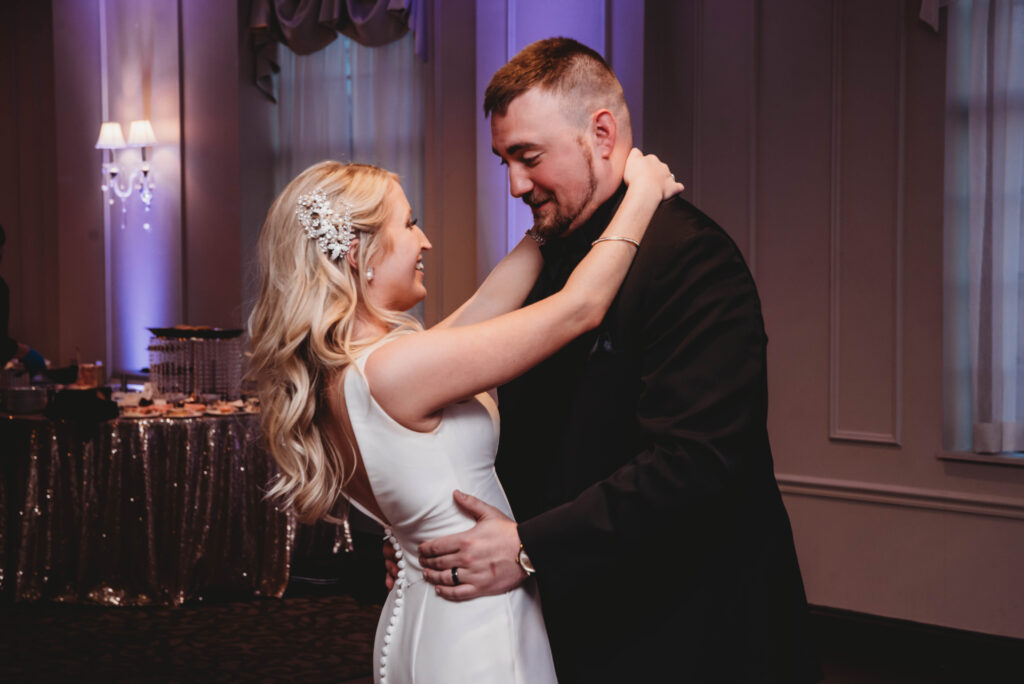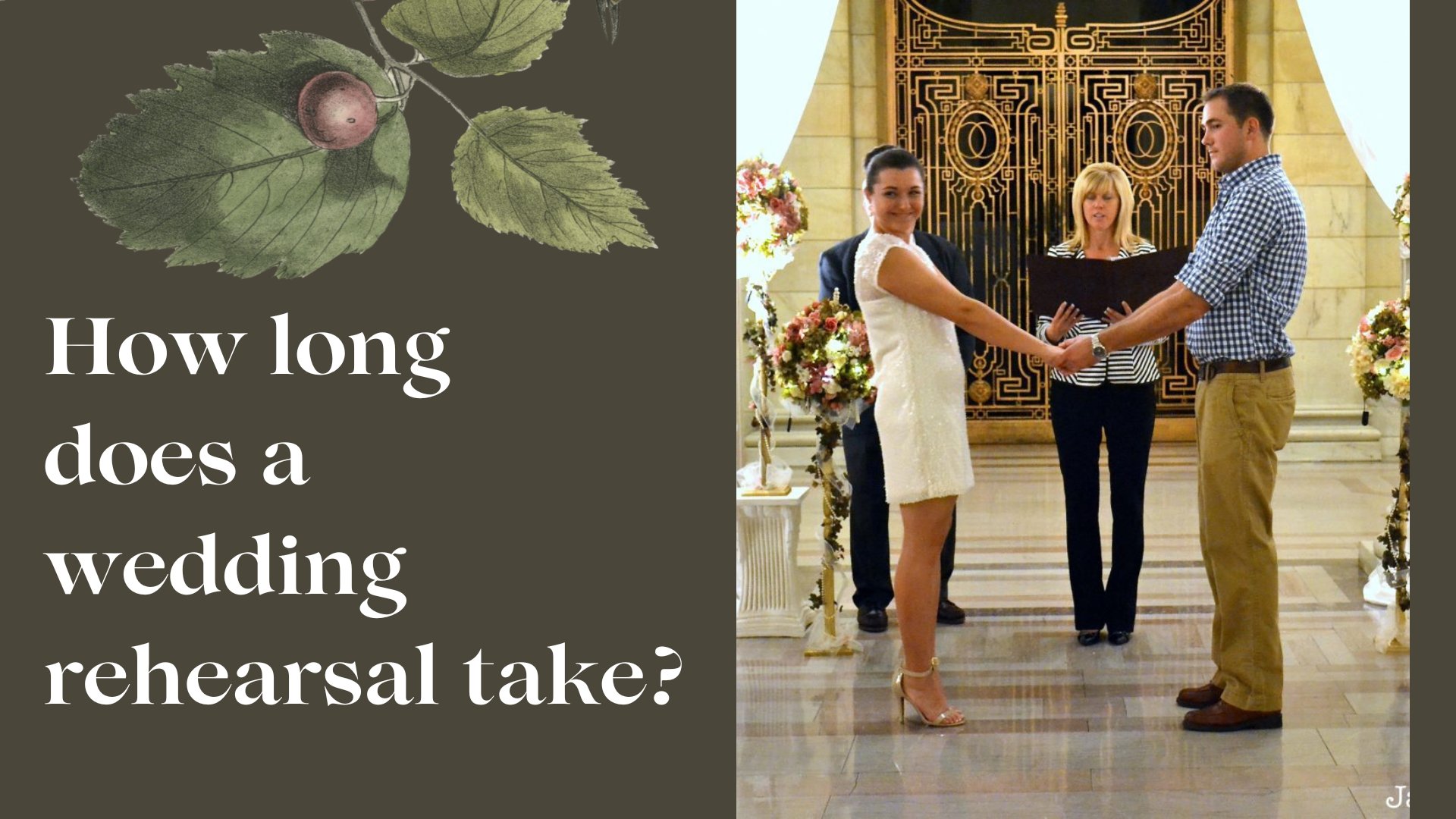The wedding rehearsal is a crucial part of your big day. It ensures that everything goes smoothly and that everyone knows their roles. It’s an opportunity to iron out any potential issues and build confidence among the wedding party. But how long does a wedding rehearsal take, and how can you prepare for it effectively? In this blog post, we’ll explore the importance of wedding rehearsals, factors affecting their duration, and essential tips for a successful and stress-free rehearsal experience.
Short Summary
- A wedding rehearsal is an essential practice session to ensure a successful ceremony.
- Factors such as the complexity and size of the wedding party can affect rehearsal duration, typically lasting 1-2 hours.
- Couples should communicate with participants, secure venue booking, and plan for the dinner in order to have a stress-free experience.
The Importance of A Wedding Rehearsal

A well-executed wedding rehearsal is key to a seamless wedding ceremony. This essential practice session allows the wedding party members, officiants, and family members to familiarize themselves with their roles and responsibilities for the big day. Wedding rehearsals help anticipate and resolve potential difficulties before the ceremony, ensuring that everything goes according to plan when the actual event takes place.
One crucial aspect of the wedding rehearsal is the presence of everyone involved in the wedding ceremony. This includes:
- The bridal party
- The officiant
- Any ceremony readers
- Child attendants
The actual rehearsal, also known as the dress rehearsal or ceremony rehearsal, typically takes place during the week of the wedding date, with many couples opting for the night before the wedding day to ensure all wedding party members are in attendance for the wedding rehearsal take(this word can probably be deleted), especially when it’s a wedding weekend event.
Benefits of Wedding Rehearsals
The advantages of a wedding rehearsal extend beyond mere practice. It helps build confidence and reduces stress among the couple and wedding party members by familiarizing them with the actual ceremony and their roles in it. By rehearsing the ceremony, couples can:
- Identify and address any potential issues, such as timing, seating arrangements, and other logistical concerns
- Ensure that any potential problems are resolved before the big day
- Allow everyone to enjoy a smooth and memorable wedding ceremony
Moreover, wedding rehearsals provide an opportunity for the wedding party members and family to meet and interact before the main event, fostering a sense of camaraderie and togetherness. This bonding experience can alleviate any pre-wedding jitters and help everyone feel more comfortable and prepared for their roles in the ceremony.
The duration of a wedding rehearsal can vary depending on factors such as the complexity of the ceremony and the size of the wedding party. A more intricate ceremony with multiple components, such as rituals, readings, and musical performances, may require extra time to ensure all elements are well-practiced. Similarly, a larger wedding party may need additional time to coordinate and practice their roles to guarantee a smooth and well-coordinated ceremony.
Understanding these factors and allocating the appropriate amount of time for the rehearsal ensures that everyone is well-prepared for their roles and responsibilities. This, in turn, minimizes the likelihood of any unforeseen complications or delays during the actual wedding ceremony.
Complexity of the Ceremony
As mentioned earlier, the complexity of the ceremony can greatly influence the duration of the wedding rehearsal. The magnitude of the wedding party, the number of readings or rituals, and the number of songs or musical pieces can all impact the intricacy of the ceremony. Furthermore, the officiant may require more time to go through the order of events with the couple and wedding party members, ensuring that everyone understands their roles in the ceremony.
To effectively manage a complex wedding ceremony, couples should consider delegating responsibilities to a wedding planner, communicating clearly with participants, and practicing mindfulness. These strategies can help ensure that all elements of the ceremony are well-coordinated and executed smoothly, resulting in a memorable and enjoyable wedding experience.
Size of the Wedding Party
The size of the wedding party also plays a significant role in determining the duration of a wedding rehearsal. Larger wedding parties with more bridesmaids, groomsmen, and other participants may require extra time to practice their roles, coordinate their processional and recessional order, and familiarize themselves with the layout of the ceremony venue.
To facilitate the coordination of a larger wedding party, it is crucial to assign roles to each member, provide clear instructions, and allocate extra time for practice. By doing so, couples can ensure that everyone is well-prepared for their roles in the ceremony, ultimately contributing to a smooth and stress-free wedding experience.
Typical Wedding Rehearsal Timeline

A typical wedding rehearsal should last around 1-2 hours, depending on the complexity of the ceremony and the size of the wedding party. It is generally recommended to rehearse the ceremony at least two times, allowing everyone to become familiar with their roles and the sequence of events. During the rehearsal, it is vital to cover key components such as processional order, music cues, and ceremony readings, to ensure a well-coordinated and seamless wedding ceremony.
It is essential to allocate sufficient time for each component of the rehearsal and to ensure that all participants are present and engaged during the process. By doing so, couples can effectively address any potential issues or concerns, build confidence among the wedding party members, and guarantee a smooth and enjoyable wedding ceremony experience for all involved.
Recommended Duration
As mentioned earlier, the duration of a wedding rehearsal typically ranges from 1-2 hours, with the exact length depending on factors such as the complexity of the ceremony and the size of the wedding party. It is important for couples to allocate enough time for the rehearsal, ensuring that everyone has ample opportunity to practice their roles and become familiar with the order of events.
Moreover, if a more complex ceremony is planned, it is essential to factor in extra time for the rehearsal to guarantee that all elements are well-practiced and well-coordinated. By dedicating sufficient time to the rehearsal process, couples can minimize any potential complications or delays during the actual wedding ceremony, ensuring a memorable and enjoyable experience for everyone involved.
Key Components to Cover
During the wedding rehearsal, it is crucial to cover several key components to ensure a well-coordinated and seamless wedding ceremony. These components include:
- Introductions
- Processional order
- Music cues
- Ceremony readings
By practicing these elements during the rehearsal, the wedding party members, officiant, and other participants can familiarize themselves with their roles and responsibilities, ultimately contributing to a smooth and enjoyable experience when the ceremony begins.
Additionally, it is essential to allocate time for any other pertinent aspects of the ceremony, such as the exchange of vows and rings and any special rituals or performances. By covering all key components of the ceremony during the rehearsal, couples can effectively address any potential issues or concerns and ensure that everyone is well-prepared and confident for the big day.
Preparing for Your Wedding Rehearsal

Proper preparation for a wedding rehearsal involves clear communication with all participants and securing the venue in advance. By ensuring that everyone is aware of the rehearsal time, location, and their roles in the ceremony, couples can minimize any potential confusion or delays during the rehearsal process.
Moreover, securing the wedding venue in advance is crucial for a successful wedding rehearsal. This involves booking the ceremony venue for the rehearsal or having an alternate location nearby if the original venue is unavailable. By taking these steps, couples can ensure a smooth and stress-free rehearsal experience, ultimately contributing to a well-coordinated and memorable wedding ceremony.
Communication with Participants
Clear communication with all participants is essential for a successful wedding rehearsal. This includes informing everyone of the rehearsal time, location, and their roles in the ceremony, as well as providing any necessary instructions or guidance. By maintaining open and transparent communication with the wedding party members, officiant, and family members, couples can ensure that everyone is well-prepared and confident for their roles in the ceremony.
Moreover, it is crucial for couples to address any questions or concerns that may arise during the rehearsal process. By providing clear and concise answers, couples can alleviate any potential confusion or misunderstandings, ultimately contributing to a smooth and enjoyable rehearsal experience for all involved.
Securing the Venue
In addition to clear communication with participants, securing the venue is another critical aspect of preparing for a wedding rehearsal. This involves booking the ceremony venue for the rehearsal or having an alternate location nearby if the original venue is unavailable. By ensuring that a suitable location is secured for the rehearsal, couples can minimize any potential complications or delays during the rehearsal process.
Furthermore, it is important for couples to familiarize themselves with the layout of the rehearsal venue and to ensure that it is adequately set up for the rehearsal process. This includes arranging chairs, setting up any necessary audio or visual equipment, and addressing any other logistical concerns that may arise. By taking these steps, couples can guarantee a smooth and stress-free rehearsal experience, ultimately contributing to a well-coordinated and memorable wedding ceremony.
Wedding Rehearsal Dinner Planning

Planning a wedding rehearsal dinner involves understanding etiquette and traditions, as well as managing the guest list and invitations. A rehearsal dinner is a celebratory event that takes place after the rehearsal of the wedding ceremony, typically the day before the wedding. It serves as an opportunity for the wedding party, family members, and out-of-town guests to relax and enjoy each other’s company before the main event.
By adhering to proper etiquette and traditions, couples can ensure that their rehearsal dinner is a memorable and enjoyable experience for all involved. This includes:
- Deciding on the host
- Determining the formality of the event
- Planning the menu
- Managing the guest list
- Sending out invitations in a timely manner
Etiquette and Traditions
Rehearsal dinner etiquette includes determining the host of the event, which is typically the groom’s parents. However, the couple can also choose to plan and host the rehearsal dinner themselves if they prefer. In addition, it is essential to establish the formality of the event, which can range from a casual gathering to a more formal affair, depending on the preferences of the couple and their guests.
Planning the menu for the rehearsal dinner is another important aspect of rehearsal dinner etiquette. Couples should consider the dietary preferences and restrictions of their guests when selecting the menu, ensuring that there is something to suit everyone’s tastes. By adhering to proper etiquette and traditions, couples can ensure that their rehearsal dinner is a memorable and enjoyable experience for all involved.
Guest List and Invitations
The guest list for a rehearsal dinner typically includes the following:
- Immediate family members
- Wedding party members
- Out-of-town guests
- Officiant
- Readers or ushers participating in the wedding ceremony
When determining the guest list, it is important for couples to consider the size of the rehearsal dinner venue and the availability of accommodations for out-of-town guests.
Invitations for the rehearsal dinner should be sent out 4-6 weeks in advance to give guests ample notice. Couples can choose to send formal rehearsal dinner invitations or opt for more casual methods such as online invitations or phone calls. By managing the guest list and invitations effectively, couples can ensure that their rehearsal dinner is well-organized and an enjoyable event for all attendees.
Tips for a Stress-Free Wedding Rehearsal

To ensure a stress-free wedding rehearsal, it is crucial to delegate responsibilities and practice mindfulness techniques. Delegating tasks, such as coordinating participants and managing the rehearsal timeline, to a designated person, like a wedding planner or trusted friend, allows the couple to focus on their roles in the ceremony. This can help reduce stress and anxiety during the rehearsal process, ultimately contributing to a more enjoyable and successful wedding rehearsal experience.
Mindfulness techniques, such as deep breathing and meditation, can also be beneficial in reducing stress.
Delegating Responsibilities
Assigning tasks to a designated person can help ensure that all aspects of the wedding rehearsal are well-coordinated and executed smoothly. This includes coordinating participants, managing the rehearsal timeline, and addressing any logistical concerns that may arise. By delegating these responsibilities, couples can focus on their roles in the ceremony, such as exchanging vows and rings and any special rituals or performances they have planned.
Moreover, delegating responsibilities can help alleviate stress and anxiety among the couple and wedding party members, as it ensures that everyone is well-prepared and confident for their roles in the ceremony. This, in turn, contributes to a smooth and enjoyable wedding rehearsal experience for all involved.
Practicing Mindfulness
Practicing mindfulness techniques, such as deep breathing and visualization, can help reduce stress and anxiety during the rehearsal process. By focusing on the present moment and recognizing one’s thoughts, feelings, and sensations without judgment, couples and wedding party members can maintain a calm and focused demeanor during the rehearsal.
These mindfulness techniques can be particularly beneficial in helping couples and wedding party members remain composed and collected during the rehearsal, ultimately contributing to a more successful and enjoyable wedding rehearsal experience.
By incorporating mindfulness practices and effective delegation, couples can ensure a stress-free and well-coordinated wedding rehearsal, setting the stage for a memorable and beautiful wedding ceremony.
Summary
In conclusion, a well-planned and executed wedding rehearsal is essential for a smooth and successful wedding ceremony. By understanding the importance of wedding rehearsals, factors affecting their duration, and essential tips for a successful and stress-free rehearsal, couples can ensure that their big day is a memorable and enjoyable experience for all involved. With proper preparation, communication, and mindfulness, your wedding rehearsal can set the stage for a beautiful and unforgettable wedding ceremony.
Frequently Asked Questions (FAQ)
How long do wedding rehearsals go?
A wedding rehearsal typically lasts around one hour, allowing enough time to practice and for lingering. The dinner or welcome party often follows immediately afterward, so be sure to give your wedding party advance notice of the event.
This will give them time to plan and prepare for the rehearsal and the party afterward. It will also help ensure that everyone is on time and ready to go when the rehearsal begins.
How long does a wedding rehearsal dinner take?
The rehearsal dinner typically lasts two to three hours, including time for guests to arrive and settle in, eat, and do any planned activities like speeches or gift-giving.
These activities can be tailored to the couple’s preferences and can be as formal or informal as desired. Guests can be invited to give toasts or speeches, or the couple can opt for a more casual atmosphere with music and dancing. Gifts can be given.
How long do Catholic wedding rehearsals last?
Catholic wedding rehearsals usually last around an hour and are typically held on the Friday before a Saturday wedding.
Rehearsals are an important part of the wedding process, as they help the wedding party become familiar with the ceremony and the order of events. They also provide an opportunity for the couple as well.
What factors affect the duration of a wedding rehearsal?
The duration of a wedding rehearsal is affected by the complexity of the ceremony and the size of the wedding party.
For a more complex ceremony, the rehearsal may take longer. If the wedding party is larger, more time may be needed to ensure everyone is familiar with their roles.
Who should be invited to a wedding rehearsal dinner?
Immediate family, wedding party members, and out-of-town guests should be invited to the rehearsal dinner.


